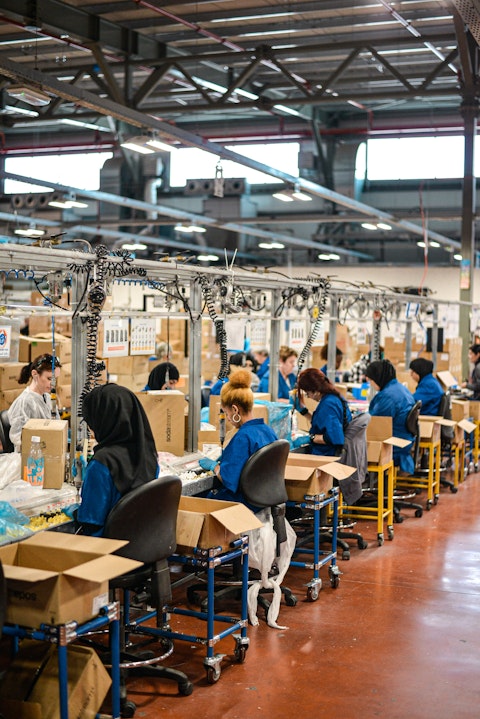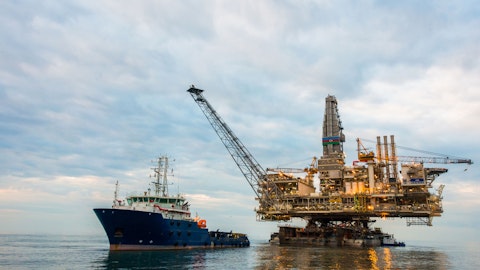In this piece, we will take a look at the 25 biggest companies in Europe by employees. For more companies, head on over to 5 Biggest Companies in Europe by Employees.
The European economy has not been doing well lately. The 2022 Russian invasion of Ukraine shocked the global energy market and hit the continent pretty hard due to its reliance on cheap Russian fuels. Then, the U.S. Federal Reserve started raising interest rates at an unprecedented pace. This ended up sapping market confidence in major currencies such as the Euro and the Pound, sending the major European currencies to new lows.
In fact, the true dependence that Europe had on Russia for its energy imports — and the extent to which Russia had relied on European revenues for its energy sector — remains unclear until we look at some cold, hard numbers. According to an estimate from the European Commission, at the time of the war, Russia had accounted for 45% of the European Union’s natural gas imports – making it the single largest supplier. This trend was also present in the EU’s crude oil imports, as Russia supplied 27% of the bloc’s oil. This heavy reliance also ended up filling Russia’s coffers to fund its Ukraine invasion, as a report from the Centre for Research on Energy and Clean Air (CREA) showed that by the end of April 2022 – two months after the war started – the EU imported 71% of Russia’s €63 billion of fuel exports, amounting to €44 billion.
Within the bloc, Germany was the largest importer, accounting for €9.1 billion of the import bill, with Italy and the Netherlands also contributing significantly in the form of €6.9 billion and €5.6 billion of fuel imports, respectively. Russian oil and gas giants such as Public Joint Stock Company Gazprom (MCX:GAZP.ME), Public Joint Stock Company Rosneft Oil Company (MCX:ROSN.ME), and PJSC LUKOIL (OTCMKTS:LUKOY) played a crucial role during this time period. These firms are also some of the biggest European companies in terms of employees.
However, the era of high reliance on Russian gas for the EU seems to be over. According to the European Commission’s latest data, while 37.1% of the bloc’s gas imports were from Russia in March 2022, they have now dropped to 12.9% in November 2022. At the same time, the share of supplies from non-Russian sources is at an all time high, as it stood at a whopping 87.1% by the end of the same month. The U.S. has been crucial in picking up this shortfall, with giants such as Exxon Mobil Corporation (NYSE:XOM) supplying large quantities of liquefied natural gas (LNG) to Europe. To gauge the growth in US LNG exports to Europe in numbers, consider the fact that while total exports had stood at 650 million cubic meters in January 2021, they peaked at 5.78 billion in March and April 2022, and sat at 4.09 billion as of November 2022. While you might be wondering at the drop between April and November, this period saw countries such as Germany stockpile the LNG to build their reserves to avoid future energy shocks.
Given the unavoidable interlinkage of energy with the broader market, it is still surprising that the economic impact of the invasion, the biggest of which was inflation, did not have a significant impact on the European labor market. Some of Europe’s biggest companies in terms of employees were steadfast, and the market was shielded from this due to the bloc’s response to the coronavirus pandemic, as rapid vaccinations led to a quick reopening and job growth just as the invasion’s impact began to be felt. On this front, the European Commission reports that the impact of the invasion’s inflation began only during the third quarter of 2022, as the employment growth slowed quarter over quarter but remained higher annually. At the same time, labor shortages continued to persist, as an aging population chose to retire. Some industries that faced the highest number of shortages were the tobacco sector, the coke and refined petroleum industry, mineral mining, and beverages.
While the labor market remained relatively insulated due to the energy driven inflation, the broader market did feel the heat. The biggest impact was of course on Ukraine, whose economy was expected to contract by 35% in 2022. Another nation significantly impacted, particularly due to the high reliance on Russian imports, was Germany. On this front, an estimate from the head of the German Chambers of Industry and Commerce (DIHK) Peter Adrian suggests that by the end of this year, the Ukraine invasion will have cost Germany a stunning $160 billion – equivalent to 4% of the output of Europe’s largest economy. This is due to Germany’s reliance on imported fuel for its industries, which leaves it at a disadvantage with other economic powers such as France and the U.S. Some of the biggest European companies by employees are in Germany, such as Volkswagen AG (OTCMKTS:VWAGY).
Taking a look at the on ground situation, inflationary pressures from the war have eased, and things are returning to a semblance of normality, according to ArcelorMittal S.A. (NYSE:MT)’s executives. Arcelor is a European multinational steel making company, which places it right at the pulse of the economy. During the firm’s fourth quarter of 2022 earnings call, its chief executive officer Mr. Aditya Mittal shared:
So maybe I will just start with the macro and if we need to provide you further details, I’m sure Genuino can supplement. I think we started with the call by saying we have a constructive outlook, so it’s predicated on few elements. The first is that we feel that the destock has peaked and there’s lot of evidence of that just based on how our customers are ordering and what we’ve seen in terms of real demand and the pan demand. The second I would add is that energy costs, even though they are still very elevated had eased relative to the second half, particularly relative to the fourth quarter and clearly that’s positive momentum as we enter 2023 and is also positive in terms of real demand, right, because the energy complex is not just impacting us from impacts.
All European industry and impacts, the European consumer as we’re all well aware. In terms of the things that remain outstanding. I mean, first and foremost is Ukraine, where we don’t have a resolution of peace, but the immediate direct economic impact of energy has eased, and we also have a tightening monetary condition environment, right, and that’s offsetting the inflationary pressures that we have seen in 2022. So those headwinds remain.
With these details in mind, let’s take a look at Europe’s largest employers, out of which the top picks are Volkswagen AG (OTCMKTS:VWAGY), Accenture plc (NYSE:ACN), and Deutsche Post AG (ETR:DPW.DE).

Photo by Remy Gieling on Unsplash
Our Methodology
To pick the biggest companies in Europe by employees, we first identified the largest publicly traded firms based in the continent. Then, their number of employees was determined, and the top 25 were selected for our list of Europe’s biggest companies in terms of employees.
Biggest Companies in Europe by Employees
25. EssilorLuxottica Société anonyme (EPA:EL.PA)
Latest Employee Count Estimate: 154,029
EssilorLuxottica Société anonyme (EPA:EL.PA) is the world’s largest provider of eyewear products. Along with Accenture plc (NYSE:ACN), Volkswagen AG (OTCMKTS:VWAGY), and Deutsche Post AG (ETR:DPW.DE), it is one of Europe’s largest companies by employees.
24. Veolia Environnement SA (EPA:VIE.PA)
Latest Employee Count Estimate: 188,662
Veolia Environnement SA (EPA:VIE.PA) is a French energy and waste management company. It collects wastewater, delivers drinking water, and provides other services.
23. Casino, Guichard-Perrachon S.A. (EPA:CO.PA)
Latest Employee Count Estimate: 188,811
Casino, Guichard-Perrachon S.A. (EPA:CO.PA) is a French food retailer based in Saint-Étienne, France. It operates different establishments such as convenience stores, discount stores, and shopping malls.
22. BNP Paribas SA (EPA:BNP.PA)
Latest Employee Count Estimate: 190,000
BNP Paribas SA (EPA:BNP.PA) is a French regional bank that was set up in 1822 and is headquartered in Paris.
21. Continental Aktiengesellschaft (ETR:CON.DE)
Latest Employee Count Estimate: 199,038
Continental Aktiengesellschaft (ETR:CON.DE) is an auto parts company based in Hanover, Germany. It sells parts for cars, trucks, buses, and other vehicles.
20. Deutsche Telekom AG (ETR:DTE.DE)
Latest Employee Count Estimate: 206,759
Deutsche Telekom AG (ETR:DTE.DE) is a German telecommunications carrier. The firm has hundreds of millions of customers all over the world.
19. HSBC Holdings plc (NYSE:HSBC)
Latest Employee Count Estimate: 219,199
HSBC Holdings plc (NYSE:HSBC) is one of the biggest banks in Britain. Headquartered in London, it provides personal banking, commercial banking, and other services.
11 of the 943 hedge funds surveyed by Insider Monkey had held a stake in HSBC Holdings plc (NYSE:HSBC) during Q4 2022. Out of these, the largest investor is Jim Simons’ Renaissance Technologies with a $68 million stake.
18. Vinci SA (EPA:DG.PA)
Latest Employee Count Estimate: 265,303
Vinci SA (EPA:DG.PA) is a French engineering and construction firm headquartered in Nanterre, France. It builds public infrastructure. It is one of the largest companies in Europe in terms of employees.
17. ISS A/S (CPH:ISS.CO)
Latest Employee Count Estimate: 270,310
ISS A/S (CPH:ISS.CO) is a Danish company that provides workplace management services.
16. Stellantis N.V. (NYSE:STLA)
Latest Employee Count Estimate: 272,367
Stellantis N.V. (NYSE:STLA) is a Dutch car manufacturer with brands such as Alfa Romeo and Chrysler.
As of December 2022, 28 of the 943 hedge funds polled by Insider Monkey had bought Stellantis N.V. (NYSE:STLA)’s shares. Peter Rathjens, Bruce Clarke, and John Campbell’s Arrowstreet Capital is the largest investor with a $332 million stake.
15. Nestlé S.A. (SWS:NESN.SW)
Latest Employee Count Estimate: 275,000
Nestlé S.A. (SWS:NESN.SW) is one of the largest food and beverage companies in the world.
14. Sberbank of Russia (MCX:SBER.ME)
Latest Employee Count Estimate: 287,866
Sberbank of Russia (MCX:SBER.ME) is a Russian regional bank headquartered in Moscow. With close to 300,000 employees, it is one of the largest employers in Europe.
13. Siemens Aktiengesellschaft (ETR:SIE.DE)
Latest Employee Count Estimate: 313,000
Siemens Aktiengesellschaft (ETR:SIE.DE) is a German industrial equipment manufacturer headquartered in Munich.
12. Fresenius SE & Co. KGaA (ETR:FRE.DE)
Latest Employee Count Estimate: 316,290
Fresenius SE & Co. KGaA (ETR:FRE.DE) is a German hospital products provider set up in 1912.
11. Teleperformance SE (EPA:TEP.PA)
Latest Employee Count Estimate: 334,896
Teleperformance SE (EPA:TEP.PA) is a French care services provider headquartered in Paris.
11. Tesco PLC (OTCMKTS:TSCDF)
Latest Employee Count Estimate: 345,000
Tesco PLC (OTCMKTS:TSCDF) is a British grocery chain with a global presence.
10. Carrefour SA (EPA:CA.PA)
Latest Employee Count Estimate: 346,666
Carrefour SA (EPA:CA.PA) is a French multinational superstore chain.
9. X5 Retail Group N.V. (MCX:FIVE.ME)
Latest Employee Count Estimate: 353,196
X5 Retail Group N.V. (MCX:FIVE.ME) is a Dutch food retailer that operates primarily in Russia. Despite this, it is one of the biggest European companies in terms of employees.
8. Public Joint Stock Company Magnit (MCX:MGNT.ME)
Latest Employee Count Estimate: 357,000
Public Joint Stock Company Magnit (MCX:MGNT.ME) is a Russian supermarket and pharmacy chain.
7. Capgemini SE (EPA:CAP.PA)
Latest Employee Count Estimate: 359,,567
Capgemini SE (EPA:CAP.PA) is a French engineering services provider headquartered in Paris. It joins Volkswagen AG (OTCMKTS:VWAGY), Accenture plc (NYSE:ACN), and Deutsche Post AG (ETR:DPW.DE) in our list of Europe’s largest employers.
Click to continue reading and see 5 Biggest Companies in Europe by Employees.
Suggested Articles:
- 20 Largest Manufacturing Companies in the World
- 13 Best News and Digital Media Stocks To Buy
- 12 Largest Coal Mining Companies in USA
Disclosure: None. 25 Biggest Companies in Europe by Employees is originally published on Insider Monkey.





